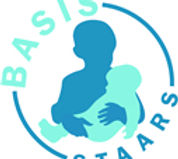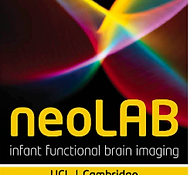PIPKIN Research Team
Sarah Lloyd Fox
Principal Investigator
As a UKRI Future Leaders Fellow, I am lead investigator of PIPKIN and Brain Imaging for Global Health (BRIGHT) Study. By mapping brain and cognitive function in the first days and months of life, I hope to better understand how the world we live in mediates early brain specialisation and behaviour

I pioneered the use of fNIRS in infants, focusing on developing field-friendly toolkits for use in low income and home settings. In partnership with community-informed initiatives, I hope to optimise family-mediated interventions that bridge the transition between pre- to post-natal life. Research insights will be communicated to suit the needs of individual communities in the UK & global health contexts.
Mark Johnson
Principal Investigator
The focus of my research is the study of functional brain development over the first years of life. The key questions that motivate my research concern how specialized cognitive functions emerge within particular brain regions (e.g. the cerebral cortex) during development.

I am particularly interested in the development of the newborn social brain, specifically activity during face perception, eye-gaze perception and eye-gaze cued action, and the perception of human action. Through imaging (ERP, NIRS) and behavioural testing methods, my goal is understand the typical and atypical development of the human social brain network.
Maria Rozhko
Doctoral Student
I am an aspiring developmental psychologist and a mother of an extraordinary boy. I joined the PIPKIN study in 2022 after completing a Master's degree in Singapore. I am interested in the early development of a baby's temperament and its role in shaping the parent-child relationship and early cognitive development.

Borja Blanco
Research Associate
As a PhD in cognitive neuroscience at the Basque Center on Cognition, Brain and Language (BCBL) my research focused on investigating the influence of early bilingual exposure on the development of resting-state functional connectivity and speech processing during the first months of life.

In PIPKIN, my interest will be on optimizing the application of a wearable fNIRS neuroimaging toolkit for monitoring early functional brain development in naturalistic setups. The diffusion optical tomography capabilities of the new fNIRS toolkit will allow us to compute 3D images of functional brain activity.
Laura Carnevali
Research Associate
At the PIPKIN project I examine how babies attune to others and learn about the social world. Studying the origin and development of the mechanisms that predispose us to interact can provide new insights on how to nurture social bonding from very early ages and ultimately inform future research in the context of neurodiversity.

Doctoral Student
I am an ESRC funded doctoral student working on the PIPKIN project and collaborating with the Brazelton Centre. My main interests lie in examining how the prenatal world maps onto postnatal outcomes and how factors such as maternal diet, the microbiome and socioeconomic status shape this development.
.jpeg)
I will also work in a knowledge-exchange partnership with the Brazelton Centre, using their expertise with the Neonatal Behavioural Assessment Scale (as an assessment and intervention) and focus groups, along with the findings from PIPKIN, to develop an app-based intervention for those most vulnerable to adverse outcomes.
Matthew Weatherhead
Doctoral Student
At the PIPKIN project I examine how babies attune to others and learn about the social world. Studying the origin and development of the mechanisms that predispose us to interact can provide new insights on how to nurture social bonding from very early ages and ultimately inform future research in the context of neurodiversity.
_jfif.jpg)
Xiangyi Ma
Research Assistant
I'm a research assistant at the diversity PIPKIN team. I obtained an MSc in Cognitive Neuroscience from King's College London. My dissertation was collaborated with University of East London and was focused on non-verbal vocalisation, joint attention, and arousal during infant-mother interactions.
_JPG.jpg)
Beyza Ustun-Elayan
Research Associate
I’m a developmental psychologist and perinatal researcher studying how the first 1,000 days of life shape long-term health and development. At the PIPKIN project, I use 4D ultrasound scans to explore how fetuses respond to (non-)communicative sounds in the womb, and how these early exposures influence behaviour, social, and language development after birth.

Noelia Corral Ferre
Project Coordinator
As the PIPKIN Project Coordinator,I am the foundation for the team, providing administrative assistance and project management support. I have an extensive background in Marketing & Events Project Management and experience working across private and charity sectors in the UK and Spain.

Cristina De La Iglesia
Research Associate
I am a Research Midwife working at The Rosie Hospital in Cambridge. My background is neonatal care, where I worked as a neonatal and obstetric nurse before I completed my Midwifery Degree at City University London. I worked as a clinical midwife for longer than ten years, now specializing in research.
.jpg)
My passion is to support and advocate women throughout pregnancy and postpartum period. I am particularly interested in developing ways to provide the care and support that mothers and infants really need over the first year of babies’ life.
Alumni and Associates
Virag Lakner
Visiting Researcher
At the PIPKIN project I examine how babies attune to others and learn about the social world. Studying the origin and development of the mechanisms that predispose us to interact can provide new insights on how to nurture social bonding from very early ages and ultimately inform future research in the context of neurodiversity.

Merel van der Straaten
Visiting Research Student
I am a visiting MSc student from Utrecht University, where I examined the impact of music exposure on preterm infants’ structural brain development and sleep at the Wilhelmina Children’s Hospital. For the BRIGHT project, I investigate the modulatory effects of sleep states on functional connectivity in 1-month-old Gambian infants.
_jfif.jpg)
I was awarded my PhD from Temple University, where my NSF fellowship focused on how the ability to filter attention develops from infancy to adulthood. I also trained as a sonographer, measuring how babies' movement in the womb related with their mother's health. I am invested in ensuring developmental science reflects a broad, inclusive notion of human variability.
I was awarded my PhD from Temple University, where my NSF fellowship focused on how the ability to filter attention develops from infancy to adulthood. I also trained as a sonographer, measuring how babies' movement in the womb related with their mother's health. I am invested in ensuring developmental science reflects a broad, inclusive notion of human variability.
Dianna Ilyka
Doctoral Student
I joined the Cambridge Babylab in October 2019 as a Marie-Sklodowska Curie Early Stage Researcher to pursue a doctoral degree, intending to investigate how social experiences following birth relate to infants’ development of brain mechanisms involved in the processing of social information.
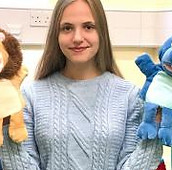
Understanding how environment shapes the developing brain is crucial to informing us about the ideal conditions for babies’ growth. I am also interested in working with infant-friendly neuroimaging approaches such as functional near-infrared spectroscopy (fNIRS). I hope to contribute to further optimization of these techniques in wider settings and with various populations.
Katharina Kolland
Visiting Research Assistant
I am a German-Irish visiting student from the University of Glasgow. I have had the privilege of working with the Max-Planck-Institute for Human Cognitive and Brain Sciences previously, focusing on Theory of Mind and minimal agency in infants as measured through EEG and Eye-Tracking, areas related in PIPKIN.
.png)
Livia Branco
Visiting Doctoral student
I am a visiting PhD student from Mackenzie Presbyterian University in Brazil. My research focuses on the importance of social touch in infants' emotional development, particularly how different types of caregiver-infant touch influence emotional regulation in early life. As part of the PIPKIN team, I was interested in the use of the fNIRS technique to investigate brain responses in infants, as well as early parent-child behavioral interactions.

Zahra Khan
Masters Research Assistant
Zahra studied BSc Psychology at Aston University before starting her MPhil in Biological Science (Psychology). In her undergraduate placement year, she worked as a psychology assistant within perinatal mental health at University College London Hospitals.

Kaili Clackson
Research Associate
My PhD focused on studying how language is processed in the brain, and how this develops during childhood. On becoming a mother I felt bombarded with conflicting information about parenting and had many unanswered questions about how babies develop. I hope to use research for insight into
parenting.

Staci Meredith Weiss
Research Associate
I yearn to understand the development of the "body schema", or how babies use what they know about their own bodies (even in the womb!) to explore their new, different world right after they are born. I study how babies' movements reflect their recognition that body parts have distinct sensory & motor functions (mouth vs. eyes).
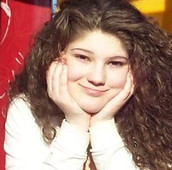
I was awarded my PhD from Temple University, where my NSF fellowship focused on how the ability to filter attention develops from infancy to adulthood. I also trained as a sonographer, measuring how babies' movement in the womb related with their mother's health. I am invested in ensuring developmental science reflects a broad, inclusive notion of human variability.
Student Research Interns

Sophie Bishop
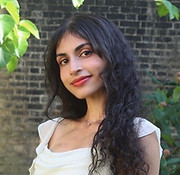
Tridha Haritwal

James Bennion

Najifa Ahmed
.png)
Zayna Mian

Romy Sokolow
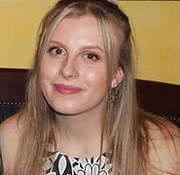
Maddie Walton
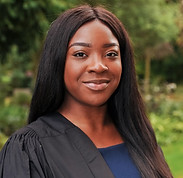
Esther Ademeno
Collaborators and Project Partners
-
Topun Austin (Cambridge, UCL) is our clinical consultant on PIPKIN and has expertise in premature neuodevelopment & neonatal neouroimaging suitable for NICU.
-
Simon Baron-Cohen (Cambridge) has expertise in fetal fMRI and ultrasound, as well as genetic and hormonal assays implicated ASD pathogenesis.
-
Tony Charman (KCL) has expertise in clinical diagnosis and biomarker identification related to early ASD and ADHD.
-
Clare Elwell (UCL) has expertise in newborn optical brain imaging, including fNIRS, for use in home, hospital, global and resource-poor settings.
-
Nadja Reissland (Durham) has expertise in fetal development, maternal mental health, and developed a coding scheme for identifying fetal behavior during ultrasound.
-
Emily Jones (Birkbeck) has expertise in conducting longitudinal EEG and eye-tracking acquisition studies of infants at high risk infants for neurodevelopmental conditions.
-
Andrew Pickles (KCL) has expertise in the biostatistics applied to human development and longitudinal modeling of neurodevelopment.


